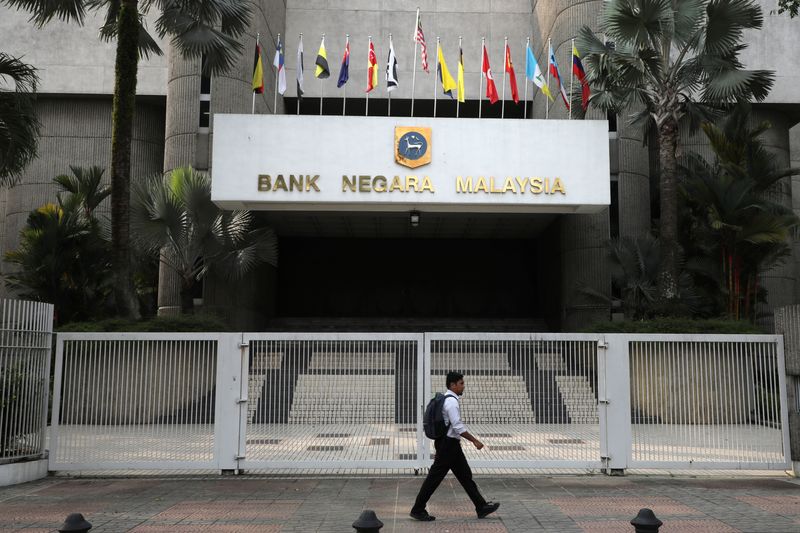By Anant Chandak and Shaloo Shrivastava
BENGALURU (Reuters) - Malaysia's central bank will raise rates by 25 basis points on Wednesday, its first consecutive rise in more than a decade, to rein in inflation stemming in part from a weaker ringgit as the U.S. Federal Reserve hikes aggressively, a Reuters poll found.
Bank Negara Malaysia (BNM), although dealing with low inflation compared with many other economies, unexpectedly raised its key overnight policy rate by 25 basis points to 2.00% at its May meeting.
All 22 economists in the June 27-July 1 poll forecast rates to rise by another 25 basis points to 2.25% at the July 6 meeting. The central bank last raised rates twice in a row in mid-2010.
Still, BNM, which has said it intends to take a "measured and gradual" pace, was expected to go slow compared with other global peers.
A slight majority of survey respondents, 12 of 22, predicted another 25 basis point rise in September to 2.50%, while the remaining 10 expected no change after a July hike.
Either way, more rate hikes are certainly coming.
"BNM will be mindful of potential upside pressure to inflation stemming from recent increases in minimum wages, upward adjustments in price ceilings for certain food products, and a pickup in demand-pull inflation on the back of economic reopening," noted Derrick Kam, Asia economist at Morgan Stanley (NYSE:MS).
Inflation rose to 2.8% in May from 2.3% in April. The Malaysian ringgit lost ground last quarter and has weakened nearly 6% so far this year, raising the prospect of imported inflation pressure.
"The Malaysian ringgit has been falling against the greenback due to aggressive rate hikes by the U.S. Federal Reserve, and raising the overnight policy rate will help to shore up the currency by maintaining the interest rate differential," said Denise Cheok, an economist at Moody's (NYSE:MCO) Analytics.
For the November meeting, 12 of 22 analysts in the poll predicted rates at 2.50%, eight said 2.75% while two said 2.25%.
Median forecasts from the poll also predicted 25 basis points hikes in each of the first two quarters of 2023. For Q1 2023, nine of 20 economists expected rates to rise to 2.75%, six forecast 3.00% while five said 2.50%.

The overnight rate was expected to reach its pre-pandemic level of 3.00% in the second quarter next year. Around half of respondents, nine of 19, predicted it to have risen to 3.00%, six said 2.75%, three said 2.50% and one said 3.25%.
BNM at its May meeting kept its 2022 economic growth forecast between 5.3%-6.3% and projected headline inflation to remain between 2.2%-3.2% this year.